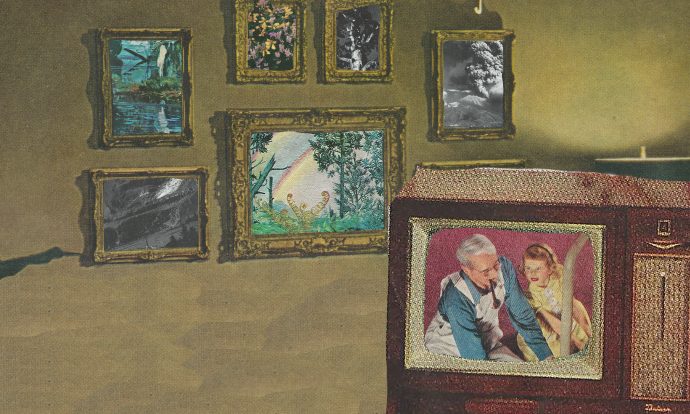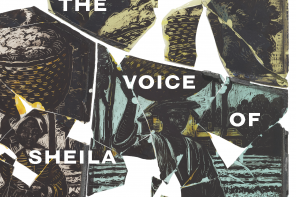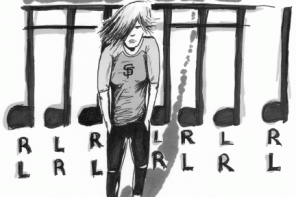What I call the Golden Age of inquiry on television stretches from Perry Mason in the late fifties and early sixties, to Columbo and Quincy on the NBC Mystery Movie in the seventies. The pleasures of those shows come from the dogged relentlessness of their heroes, all in the service of that final moment when the scales fall from the eyes of the unfortunate prosecutor or smug murderer or obstinate bureaucrat. Lawyers, cops, and doctors have long been the meat-and-potatoes of the televised dramatic diet, because new stories can come through the doors of their workplaces every week. Luckily for us inquiry junkies, their jobs involve finding out the answers to questions. Imagine if TV had stuck to cowboys and soldiers.
Having realized, belatedly in the middle of my academic career, that inquiry is my true passion, I now see it everywhere—especially in the popular culture where I moonlight as a critic and promiscuous enthusiast. Often the inquiry is real (and spectacular), like in the true-crime podcasts that popped up in the wake of Serial’s success. (I devoured the Adnan Sayed follow-up podcast Undisclosed last summer; now I’m enjoying Breakdown from the Atlanta Journal-Constitution, a deep dive into miscarriages of justice.) My favorite nonfiction podcasts are pretty much intravenous lines for inquiry: 99 Percent Invisible, Life of the Law, Criminal, Reply All, In Our Time, Embedded, Planet Money.
As with the Silver Age of comics, today’s Silver Age of televised inquiry regards its audience as too impatient and jaded to sit through the procedural scenes that once dominated the form. But while Silver Age superheroes gave up crimefighting for domestic farce, Silver Age TV cops are basically Bat-men who outsource the actual detective work to techno-specialists. A quirky, brilliant, antisocial member of the team (or a gaggle of geek-chic types down at the lab) feeds questions into the computer, then translates the resulting vector graphics and/or scrolling code into answers for the NCIS or SVU dude. When law enforcement can’t get the job done, roving bands of autistic geniuses and costumed vigilantes patrol the cable bandwidth, each with its Magic Computer and wonky-yet-sexy Hackette to follow the bad guys’ cyber trail through bank statements, security footage, and for all we know, the patent office’s surprisingly comprehensive online archives.
Not a realistic picture of inquiry, certainly. Even during the Golden Age, a TV episode would skip the dead ends, yada-yadaing days of worn shoe leather in an offhand line of dialogue. A devotee of research, like myself, could get cynical about the way these shows always elide the process to get to (what they think is) the good stuff.
But alongside the magic computers and techno-wizards exists a parallel TV universe where not just the results, but the hard work of inquiry, is lovingly portrayed. Indeed, I’d say that hard work is fetishized. A young legal associate stays up all night going through boxes of documents. A single-minded detective simulates elements of a crime over and over with minute variations. A reporter scrolls through miles of microfilm. A medical examiner infects rats with tainted designer drugs to test potential zombie cures. Yes, that last one (from the delightful Rob Thomas series iZombie) is a bit specific, but it’s an example of what differentiates Research Fetish Television from Instant Gratification Television. Between the start of the rat experiment and meaningful results, whole episodes go by; a cure is only meaningful if the rats stay unzombified over time. Research requires patience.
All these scenarios, even if most frequently delivered in shorthand montage, portray inquiry as solitary, methodical, and beautiful. The lawyer works under a pool of warm light in a conference room overlooking a city skyline. The detective annoys his roommate by devoting entire rooms to safecracking or ballistics experiments. The reporter pins elements of her story to a bulletin board with labels and arrows and timelines. When I think about the research to which I wish I could devote more time, those are the images in my head: retreat, obsession, single-tasking. The accumulation of data and the search for patterns within it. Even if the depiction isn’t true to the process, it nails the wondrousness of that moment of insight. Discovery is accumulating and arranging things so that they become a window through which you can suddenly, dramatically, unexpectedly see.
Many years ago, when I was a new professor trying to fit the square peg of my theological education into the round hole of an interdisciplinary faculty appointment, I signed up for a teaching portfolio workshop. The facilitator asked us to sum up in one word what we hoped to accomplish with our teaching, and I picked “challenge.” (I was so full of myself.) Now all I want—and surely it’s not asking too much—is for my students to fall in love with finding things out. They should leave my class with a taste for turning the unknowns all around them into knowns, by asking the right questions and uncovering the resources that they need to build the answers. I’ll give them the first taste for free so that they can spend the rest of their lives chasing that high of discovery. My courses are successful if they churn out hungry, determined, relentless research junkies.
The danger for my students is that television’s focus on the eureka moment is a false promise. Students are likely to be discouraged by the lengthy, arduous, and convoluted journey it takes, in the real world, to reach it, a journey to which television nods in the hallway on its way to the next plot point. But more important than portraying the process of inquiry with scrupulous accuracy, I think, is making it the star of the show. Inquiry deserves the spotlight. It is in fact, not just in fiction, the answer to life, the universe, and everything. Much like we fall in love with love in its idealized story form, then later with the real people around us, we can fall in love with inquiry first in shorthand and then in the actual doing. And then there’s the underlying worldview communicated by inquiry-centric popular culture. Not only is it worthwhile to find things out, these shows whisper, but everything can be found out. That’s an unprovable assumption. It may be wrong; many of my fellow theologians might consider it naive, hopelessly pre-post-modern, or dangerous. But as a teacher and writer and researcher and human being, I’ve found it to be the only methodological assumption worth having.
Why do I love to be surrounded by books, barricaded in the library, scribbling and arranging and outlining? In part it’s because of those images I imbibed long ago: the scholar, the researcher, the maester, the alchemist, the inquirer. On television these days, those images are more seductive than ever. Go ahead, I want to tell my students. Fall for them. Chase that dragon your whole life long. Ask, and you shall receive; seek, and you shall find; knock, and the door will be opened unto you.
Donna Bowman is Professor of interdisciplinary studies in the Norbert O. Schedler Honors College at the University of Central Arkansas. Her Ph.D. in religious studies is from the University of Virginia. She is the author and editor of several books on process theology, including Prayer Shawl Ministries and Women’s Theological Imagination (Lexington Books, 2015) and the forthcoming Homebrewed Christianity Guide to Being Human (Fortress Press, 2017). Her episodic criticism on Breaking Bad, Better Call Saul, NewsRadio, Sports Night, How I Met Your Mother, Battlestar Galactica and other television shows can be found at The A.V. Club. She lives with her husband (fellow critic Noel Murray) and two children in Conway, Arkansas.




